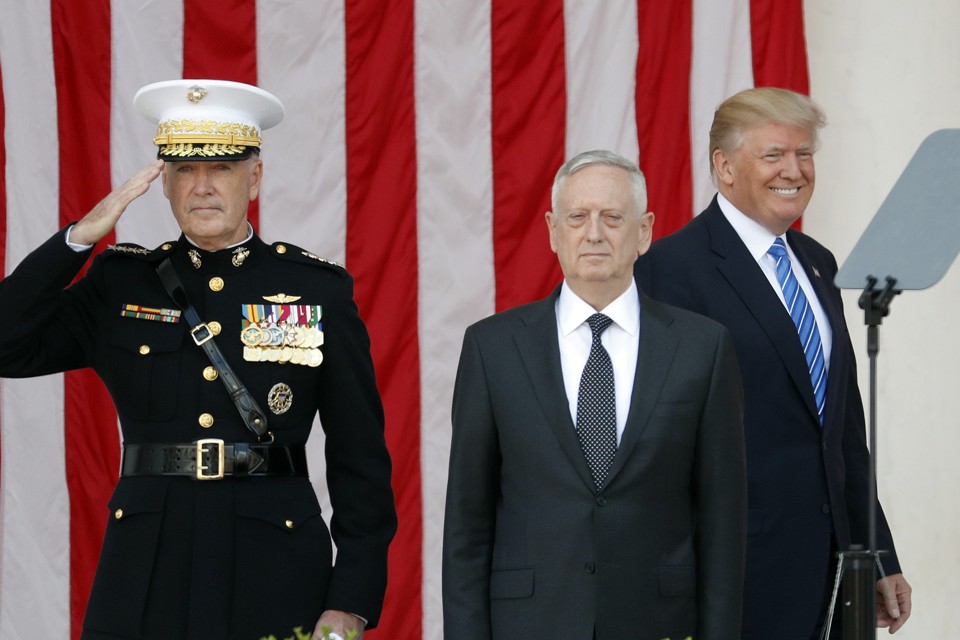The President and His Generals
"This is the only time in modern presidential history when we've had a small number of people from the uniformed world hold this much influence over the chief executive."
"They are right now playing an extraordinary role."
"To some degree, Trump is playing president, and I think the whole idea of being able to command a group of warriors is deeply satisfying to him in ways that some psychologists would have to assess."
John McLaughlin, former acting director, Central Intelligence Agency
"They [the Generals appointed to posts of elite influence in the White House] are standouts of dependability in the face of rash and impulsive conduct."
"There certainly has been a feeling among many of my colleagues that they are a steadying hand on the rudder and provide a sense of consistency and rationality in an otherwise zigzagging White House."
Senator Richard Blumenthal, D-Conn
"[Trump] came in with virtually no experience in governance and there's no coherent strategic philosophy that he holds."
"There has been a war within the administration and that has yet to be resolved . . . The military has tried to impose some coherency and discipline."
William Cohen, former Secretary of Defence
"I think these guys are more Marshall-like than Patton-like."
"They have distinguished combat records, but they're the sort of career military men who have the intellectual capability and propensity to deal with civilian matters."
R.James Woolsey Jr., former CIA director, undersecretary of the navy
"There might be a temptation to be critical of the president in this context, but I for one am glad they're there -- because they're thoughtful . . . Because they're lawful and because they're rational."
"I feel like the concern about the need to maintain civilian oversight of the military is a totally legitimate one, but that concern should be addressed at a later time. In the meantime, we should be reassured that there are competent professionals there who want to make smart choices."
Senator Brian Schatz, D-Hawaii
 |
| The Atlantic |
President Dwight D. Eisenhower was a highly respected wartime leader of the U.S. Armed Services. He had a long and distinguished career in the fighting services of the United States, serving in World War I and at a high echelon of command during World War II. During the post-war years, the man took charge of the Cold War era between the United States and the Soviet Union. In the 1950s he led the United States as its president, level-headed, competent, honourable, no hawk of war was he. Men of war don't tend to seek out conflict, but if at all possible, to avoid it.
So perhaps it's fitting that this new American president, a supreme incompetent, has surrounded himself willingly, even wilfully by well-seasoned warriors of conflict, at the same time men of caution when it comes to taking their nation into war zones. Men whose purpose has become to side-step any possible potential for this new president to launch a new world war. They are the new firefighters geared to suppress wildfires an untutored and impetuously self-confident lout has the potential to bring about.
When the President of the United States and Commander-in-Chief spectacularly failed to call out fascism and racial bigotry resulting in deadly racial violence in Charlottesville, Virginia, five of the Joint Chiefs of Staff stepped into the lapse to denouncing hatred, without equivocation. Theirs has become the collective voice of moderation in this administration. The Pentagon itself is reacting in a calmly cautious manner with respect to the impulsive 'decrees' of policy-changes emanating via Twitter.
They now counsel President Trump discreetly, advising him and allowing him to take up their recommendations and name them his own. White House chief of staff John Kelly, Defense Secretary James Mattis, national security adviser H.R. McMaster, with their personally cultivated relationship with a president who seems to trust few, but appears to trust their judgements. They are viewed by many in Congress as a calming influence for a man who bristles with indignation and the fury of entitled power when he feels himself crossed.
"It should not surprise us. Candidate Trump suggested he would defer to the people he called 'my generals' on a whole host of issues, and they are doing just that", commented Robert Hathaway, a fellow at the Woodrow Wilson Center. And if it might seem to some that the generals have become the force at play and the man who appointed them their puppet, it might be well to recall that one of the most popular presidents of fairly recent memory was Ronald Reagan for whom many others pulled the strings.

White House Chief of Staff John F. Kelly. (Jabin Botsford/The Washington Post)
Labels: Administration, Crisis Management, Donald Trump, Military, President, United States

<< Home